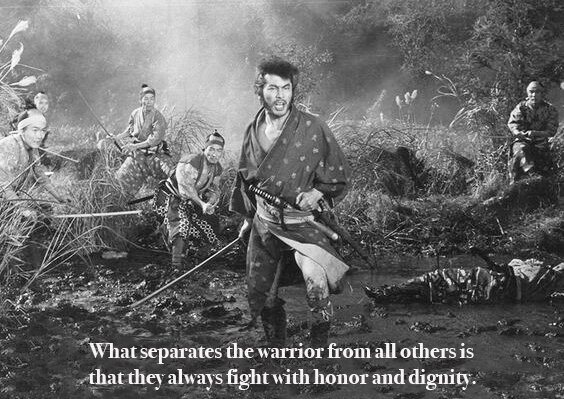花は人は武士
Hana wa sakura, hito wa bushi
Cherry blossoms among flowers, the warrior among people
Samurai movies or chambara are always filled with wonderful fight scenes. In those scenes, there is always a series of showdowns as the hero gets surrounded and kills dozens of henchmen before facing off with the movie’s villain. Besides the fact that it doesn’t make for good cinema, have you ever wondered why all the bad guys don’t just attack all at once and score the victory? One reason could be culturally as a samurai was always supposed to act with honor and courage. It is said, “Doko no karasu mo kuroi” or “Everywhere the crows are black.” This proverb was supposed to mean that all humans act the same, but warriors are supposed to be a cut above and always act with honor and decorum. To fight with honor means to be brave and so attacking someone from behind is seen as dishonorable and cowardice. During these altercations, there is always someone who does attack from behind and the hero always handedly dispatches them in dramatic bloody fashion to punish them for their indiscretion. Even if one does score the victory from behind, they would still be seen as a coward and thus their stock would fall amongst their peers. In the old days, when you confronted someone, you always stated your name, clan or school, style of fighting, teacher or lord’s name, and the reason for attacking. The samurai didn’t take death lightly and we see this in how much they valued life by all the honor and etiquette that surrounded the possibility of death. Life is like that too; because we care, we must always face our problems head on with courage and dignity. Anyone can act despite being afraid, but what separates the warrior from all others is that they do it with honor and dignity. We all want to win, but at what cost? Warriors take pride in their honor and so they fancy themselves a cut above all others.
Today’s goal: Things happen, but can you respond with dignity and grace?
Watch the clip of the movie Ame Agaru to see what samurai movie fight scenes look like and how to conduct yourself as a warrior with honor. Also, watch this motivational video about being dignity.





















